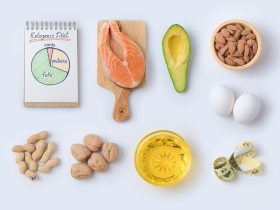Shedding excess fat and achieving a healthy body weight can positively impact men’s health. For instance, maintaining a healthy weight can reduce the risk of various health conditions, including heart disease, diabetes, specific cancers, and liver diseases. Discover the effective weight loss eating plans for men.
It’s noteworthy that men with obesity face a higher risk of chronic diseases than their female counterparts. This heightened risk is often attributed to men’s tendency to accumulate more visceral fat, a type of belly fat associated with an increased disease risk. Weight loss can also improve sexual function, mobility, mood, and overall quality of life for men.
However, it’s imperative to approach weight loss in the right way. While restrictive fad diets may lead to short-term weight loss, they are unsuitable for maintaining a healthy weight over the long term.
Instead, the focus should be on finding a sustainable and healthy eating plan that provides essential nutrients, aligns with your specific requirements, and can be maintained long-term, possibly for life.
Research indicates that the most effective strategies for men’s weight loss involve making dietary changes with increased physical activity and other behavioral adjustments. More than just relying on dieting is needed to success.
Protein-Rich Diets for Weight Loss
High protein diets have been shown to help people healthily lose weight. Protein, the most filling macronutrient, can boost your feeling of fullness when included in your meals and snacks.
Numerous studies have shown that high-protein diets outperform normal protein diets regarding weight loss.
Furthermore, high protein diets are important for maintaining muscle mass during weight loss, which helps maintain resting energy expenditure or the number of calories your body burns.
A recent study even reveals that men who follow high-protein diets are more likely to maintain their weight loss over time than those who consume less protein.
Protein requirements vary according to body size, exercise level, and age. Most high-protein diets provide at least 0.6 grams of protein per pound (1.3 grams per kg) of body weight, which is much more than the current RDA of 0.36 grams per pound (0.8 grams per kg).
Furthermore, high protein diets can be adapted to your dietary choices, with a selection of protein-rich animal and plant-based foods such as chicken, fish, eggs, lentils, and tofu.
Dietary Guidelines for the Mediterranean Diet
The Mediterranean diet, which is rich in whole foods, including vegetables, fruits, legumes, and fish, is linked to various health benefits, including a lower risk of heart disease and assistance for weight loss and maintenance.
A 12-year study comprising 32,119 people, including 9,662 men, discovered that following the Mediterranean diet strictly was associated with a lower risk of excess weight, obesity, a smaller waist circumference, and a lower likelihood of abdominal fat.
Additional study back up these findings, proving a solid link between the Mediterranean diet and weight loss and a lower risk of heart disease and diabetes.
Furthermore, the Mediterranean diet may offer protection against prostate cancer, the most common type of cancer in males and the second largest cause of cancer-related mortality in the United States.
Whole Foods, Plant-Based Diet
A whole food, plant-based (WFPB) diet offers benefits that can apply to most people, including men striving to shed excess body fat. Unlike vegan diets, which completely exclude animal products, WFPB diets incorporate small quantities of items like fish, eggs, cheese, chicken, and yogurt.
However, they primarily center around whole plant foods such as vegetables, fruits, and beans. This emphasis on unprocessed, natural foods makes WFPB diets rich in fiber and other valuable nutrients. Moreover, studies have demonstrated that WFPB diets promote weight loss.
For instance, in a review of 12 randomized controlled trials, individuals following plant-based diets, some with limited animal protein, consistently lost significantly more weight over an average of 18 weeks than those on non-plant-based diets (20Trusted Source). Opting for a WFPB diet may also assist men in lowering their risk of chronic illnesses, including specific cancers, type 2 diabetes, heart disease, and mental health conditions.
Low Carb Diets
Low-carb diets are among the most popular dietary choices, which have earned this popularity for good reasons. These diets vary in carbohydrate content, ranging from the very low-carb keto diet to more flexible, moderately low-carb options.
Low-carb eating patterns have been proven to enhance weight loss and improve men’s health. In a small, 8-week study involving 34 older adults with obesity, participants on a low carb diet, which supplied less than or equal to 10% of calories from carbohydrates, experienced a threefold reduction in visceral fat compared to those following a standard low-fat diet.
Furthermore, the low carb diet group also exhibited a nearly 8% greater reduction in total body fat while retaining more muscle mass.
Since men tend to accumulate more visceral fat than women, a diet targeting this harmful fat type can significantly improve men’s health and decrease disease risk.
Numerous other studies have consistently shown that low-carb diets with varying carbohydrate contents foster weight loss, enhance blood fat levels, and lower blood sugar levels.
Research indicates that diets moderately restricted in carbs are easier to sustain over the long term than very low-carb diets. Since long-term adherence is a crucial factor in choosing a diet, a more moderate carb approach is likely the superior option for sustainable weight loss.
High Fiber Diets
Fiber’s benefits extend beyond satiety, making fiber-rich diets an excellent weight-loss choice. Numerous studies consistently link high-fiber diets, including Mediterranean and plant-based diets, to maintaining a healthy body weight.
In a six-month study involving 345 individuals, with 46% being men, those adhering to a high-fiber diet were most likely to experience weight loss. On average, for each 10-gram increase in daily fiber intake, there was a corresponding 5-pound (2.2-kg) decrease in body weight.
Moreover, a high fiber intake may aid in reducing visceral fat and guarding against several chronic illnesses in men, including heart disease. To boost your fiber consumption, consider incorporating various high-fiber foods into your meals and snacks. These foods include berries, broccoli, asparagus, nuts, seeds, beans, oats, avocados, chia seeds, and artichokes.
Diets Emphasizing Energy and Nutrient Density
Diets that prioritize energy and nutrient density focus on the calorie content per 100 grams of food and the micronutrient content relative to calories.
Certain foods are energy-dense but nutrient-poor, such as french fries, sugary baked goods, sweetened beverages, and candy.
Conversely, low-calorie foods rich in nutrients, like vegetables and fruits, are excellent choices. A diet featuring more low-calorie, nutrient-dense foods is closely linked to weight loss and maintaining a healthy weight.
However, it’s essential to remember that high-calorie, nutrient-dense foods like nuts, seeds, avocados, egg yolks, and unsweetened full-fat yogurt also play a vital role in a healthy diet. Striking a balance between these foods and low-calorie, nutrient-dense options like veggies and fruits is a smart approach to managing a healthy body weight.
Incorporating low-calorie, nutrient-dense foods into every meal and snack can be as simple as adding a handful of spinach and chopped red pepper to your morning egg scramble, followed by sliced vegetables or fruit as an afternoon snack.
The Paleo Diet
The paleo diet restricts grains, legumes, refined sugars, and dairy products, focusing instead on whole, nutrient-dense foods rich in healthy fats, protein, fiber, vitamins, and minerals.
Evidence suggests that this diet is effective for weight loss, given that it excludes or limits many foods linked to weight gain, such as processed grain products, sugary baked goods, and soda.
A review of 11 randomized studies spanning from 2 weeks to 2 years found that, on average, individuals following the paleo diet lost 8 pounds (3.5 kg) more than those on other eating plans.
Additionally, the paleo diet tends to be more satiating than traditional low-fat diets and may support healthy blood pressure, blood sugar, and triglyceride levels.
Since grains and legumes are off-limits on the paleo diet, it’s important to ensure you consume ample vegetables, fruits, chia seeds, and other paleo-friendly foods to meet your daily fiber requirements.
The MIND Diet
The Mediterranean-DASH Intervention for Neurodegenerative Delay (MIND) diet combines elements from the Mediterranean and DASH diets, with the latter often used to reduce high blood pressure.
The MIND diet prioritizes foods beneficial for brain health, including berries, olive oil, nuts, beans, green leafy vegetables, and fish. It also recommends limiting potentially detrimental foods such as sweets and fried items.
Notably, the MIND diet has been shown to significantly reduce the risk of brain-related conditions like Alzheimer’s and may aid in weight loss for men.
Rich in fiber, healthy fats, and low-calorie, nutrient-dense foods like berries and leafy greens, this diet also encourages the use of olive oil, which is associated with maintaining a healthy body weight.
The MIND diet could be particularly advantageous for older men aiming to safeguard their brain health and lower the risk of cognitive conditions like dementia. A 2021 study revealed that adherence to the MIND diet was linked to enhanced cognitive functioning and suggested that this dietary pattern may contribute to cognitive resilience in older adults.
Intermittent Energy Restriction (IER)
Intermittent energy restriction (IER) serves as an overarching term encompassing both intermittent fasting and time-restricted eating.
While intermittent fasting involves 16 to 48 hours with little to no food intake, time-restricted eating confines food consumption to a specific window, typically spanning 6 to 10 hours within a given day.
Evidence suggests that IER can improve blood sugar regulation, blood pressure, inflammatory markers, triglyceride levels, and weight loss.
Various forms of IER exist, such as 16-hour energy restriction, 2-day fasting, and alternate-day fasting.
An analysis of 27 studies conducted over 2 to 24 weeks revealed that individuals following IER patterns achieved weight loss ranging from 0.8 to 13% of their initial body weight. Additionally, this review highlighted the positive effect of IER on blood sugar management.
Notably, most of these studies were of smaller scale, emphasizing the need for further research.
Nevertheless, some research indicates that IER could facilitate fat loss, enhance strength during resistance training, and positively impact certain aspects of psychological well-being.
For men interested in IER, a popular starting point is the 16/8 method.
However, it’s important to recognize that IER may not suit everyone. For instance, individuals with diabetes, especially those reliant on insulin, should exercise caution. Fasting may lead to dangerously low blood sugar levels, resulting in symptoms like dizziness and fainting.
If you have any medical conditions or are taking medications, it is advisable to consult a healthcare professional before embarking on an IER regimen.
Vegetarian Diets
Vegetarian diets predominantly contain plant-based foods, including vegetables, fruits, legumes, and whole grains. Certain variations, such as ovo-vegetarian and lacto-vegetarian diets, incorporate animal products like eggs or milk.
Extensive research links vegetarian diets with maintaining a healthy body weight and facilitating weight loss.
A review of three studies encompassing 20,975 men correlated plant-based diets, abundant in whole plant foods and limited in animal foods, with reduced weight gain over 4 years.
In a study involving 10,064 adults, those adhering to vegetarian diets consumed, on average, 419 fewer calories per day and incorporated more legumes and nuts into their diets compared to non-vegetarians. Both of these factors are associated with effective weight management.
It’s important to emphasize that healthy vegetarian diets should minimize the consumption of refined foods, including highly processed plant-based options such as sugary desserts, sweetened beverages, and fried foods.
In Conclusion
For men seeking to shed excess body fat, a wide array of healthy and sustainable diet options are available.
While the allure of a strict, low-calorie diet promising rapid weight loss may be tempting, it’s crucial to opt for a diet that nourishes your body, doesn’t excessively limit your choices, and can be adhered to over the long haul.
To identify the optimal diet to meet your specific requirements, collaborating with a knowledgeable healthcare provider, such as a registered dietitian, is invaluable.















Find Us on Socials